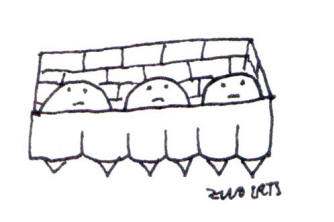| < JG 172 |
 |
JG 174 > |
Jaunā Gaita nr. 173, jūnijs 1989
JG 173
The political and cultural ferment of the past year in Latvia has been named the "Third National Awakening". A group of the leaders of this awakening, led by the president of the Latvian Popular Front, Dainis Īvāns, toured the USA and Canada this spring, and met with prominent members of the exile Latvian community during an intensive weekend seminar in Gananoque, Ontario. JG contributing editor Andrievs Ezergailis attended the seminar, arousing something of a furor by distributing to the LPF members a letter of advice on achieving their aims in the USA. The letter included some unflattering characterizations of our exile leadership (as a group), and offense was taken, particularly by a former president of the American Latvian Association, Uldis Grava. Ezergailis explains his viewpoint in his "Knots" column in this issue. The seminar was also well covered by the Latvian exile press, particularly by the newpaper "Laiks", and the bulletins of the Latvian Society of Montreal and Northern California.
We are pleased to publish in this issue the full text of Uldis Siliņš' play "Even Stones Weep". The play is set in 1942, during the Nazi occupation of Latvia, and concerns a family who learn that their daughter, a patient in a psychiatric hospital, will be killed by the Nazis (who felt that incurable mental patients are only a useless drain on the resources of the Reich). The main character, the girl's father, is presented as a thoroughly unpleasant type, receiving his just reward at the denouement of the play, but who nevertheless elicits our sympathy for his plight.
Two critical essays are featured in this issue: Ofelija Sproģere writes about Jānis Medenis (1903-1961), a poet who participated in and chronicled major events of our century in Latvia: the War of Independence (1918-1920), the Latvian republic (1918-1940), the Second World War and the Gulag Archipelago. His patriotic verse and love poems are among the finest in Latvian literature, while his poems on his experiences in the Gulag are uniquely expressive. Medenis' experiments in form, particularly with the Latvian "dainas", gave rise to a new metre, appropriately called the "Medenis metre". Ildze Kronta, a critic living in Latvia, takes a hard look at the work of novelist Jānis Mauliņš. The thematic thread running through all of Mauliņš' work is that of the "old virtues": family life, honest work and an honest, straightforward approach to life. Unfortunately, these virtues ran counter to the "socialist" virtues of the sixties and seventies, leading to the curious situation that Mauliņš' work was praised and criticized for the wrong reasons: where he deserved praise for themes of his novels, he encountered official censure, and where he deserved criticism for his sometimes poor literary craft, he was only praised.
Our regular contributor Juris Mazutis looks at gifts in this issue, in particular, the treacherous gifts given knowingly to "the enemy", and unwittingly, to ourselves and future generations: the infamous "butterflies" of Afghanistan, the torture of Iraqi children in front of their parents; Chernobyl and other, as yet undiscovered environmental disasters, the destruction of the rain forests, and the heedless pollution of the earth, for which we in the "First World" are largely responsible - these are all landmines upon which humanity might eventually stumble.
We also have a contribution from Imants Sakss, our music editor, and the final installment of two articles begun in our previous issue: Roberts Mūks' erudite essay on "Christianity and Technology", and "Latvian Resistance During the 1942-1945 Occupation" from the 1947 issues of "Free Latvia". Rasma Rozīte has contributed a translation of a German mystic's reading of a sash from Lielvārde, which seems to contain the entire history of the weaver's ancestors, the Letgali, woven into its incredibly intricate pattern (see pg. 31 for a fragment of this sash).
Poetry in this issue is by Veronika
Strēlerte (Sweden), Eduards Salna (England),
The book review section looks at Māra Zālīte's latest collection of poetry, a collection of the literary work of Dzintars Freimanis, published as a memorial tribute by his friends, the first 3 volumes of the Latvian Encyclopedia, published by the American Latvian Association, and the 28'th volume of Archīvs, a collection of essays on the theme of the stages of human life.
Laris Strunke contributed the frontispiece (pg. 2) titled "Sea Sign", while the drawing on pg. 1 is titled "Aug. 23, 1939" (the date of the signing of the Molotov-Ribbentrop Pact) and is by Imants Zilberts (Zilberts also contributed the comment on the situation in Baltic states, below). Both artists live in Sweden. The cover is by Maija Šlesere (USA).
Ilze Valdmanis
